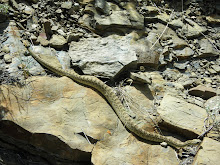Maybe professional industry geologists, like
Brian, have gotten so soft sitting behind desks that they only associate with
domestic mammals in the field. But here, in the grad school trenches, where life is hard and blood is cheap, we don't pansy around with animals that take orders from humans.
No sir, we roll WILD BURRO style, rocking the Death Valley with the O.G. of ungulates:

Awwwww...they're so cute! Who's a good burro? Who's a good burro then!?! You are a good burro!



5 comments:
Did you guys get out of there okay? What a dangerous situation.
Btw, I am getting soft ... it's quite sad.
I'm not going to lie to Brian...I was scared. Scared for my life. Especially from the little burro in the middle. He had "mean eyes".
Eric, I am wondering as a (what did you say you were?) a biologists, geologist? Anyways, speakling of wild burros (and horses) on our public lands,...what do you think of environmental groups like Sierra Club, etc. (theres more) that want our wild horses and burros off of our public lands and believe they are the ones declimating our public rangelands?
Of course, it would do well to know that privately owned cattle grazing our public land out number the equines 200 to one.
Why cant the "wild-life" eco-biologists recognise the free-roaming wild horses are a part of Americas Heritage and are entitled to the land, "native species" or not?
Mulekist - I think that there are two levels of questions you are asking here.
First, regarding the BLM rangeland managment strategy, I think both you and I can agree that it is really an abysmal plan, largely focused on managing private sector access to natural resources. Now, I don't have a problem with that (in theory); there are important mineral and hydrocarbon resources on public lands, and these need to be managed. My problem with the BLM is that this managment policy is largely a free-for-fall, anything-goes sort of system that places corporate intrests (including large ranching operations) ahead of everything else. There needs to be MUCH tighter oversight over public lands, for both environmental AS WELL AS economic reasons. Just look at SW Wyoming, which is pretty much been brutalized by the boom/bust cycle of petroleum prospecting and production, largely as a result of BLM policy. SO, on the whole, I think that BLM policies are poorly thought-out.
More specificially, the issue of wild horses; to me, this is one of the rare cases of the BLM being honest about it's intrests and goals. The BLM wants to manage rangelands for the cattle-industry (and, to a lesser extent, sheep), and the presence of OTHER large ungulates makes that difficult.
I think that this is another example of the BLM failing to protect the public lands; I would rather have the considerably more fairly delicate range-land set aside away from large herds OF ANYTHING. I don't want cows, but I also don't really want horses out there either, who compete with prong-horns and elk (in some cases).
Which I think gets to crux of the problem; free-range wild horses would decimate public lands without close population control. They have no natural predators, and are every bit as capable of cropping down praire and range grasses, resulting in the sage-brush covered over-grazed lands that one sees in much of eastern Montana. It is very unfortunate that so many horses have to be killed, which is why the USGS has undertaken long-term studies on sterilization and birth-control methods on horse-herds in the west.
Also, I think your argument regarding the "Heritage" of free-ranging horses is a little too romantic for such a delicate, scientific issue as ecosystem managment. What exactly is the "Heritage" you are talking about? The reintroduction of the horse to North America by the Spansih is, I think, an example of the disasterous imperialism that marked the beginning of the end of both the old rangelands ecosystem AS WELL AS the exterpation of much of the Native American culture in the west.
Well, I do not actually imagine it is likely to have effect.
Post a Comment